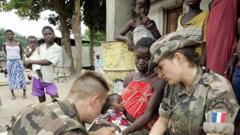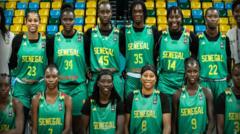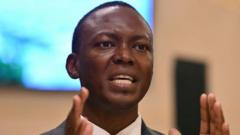In a significant policy shift, Ivory Coast has confirmed the withdrawal of French troops stationed in the country, following similar moves in Senegal and other West African nations. This transition underscores the government's efforts to modernize its armed forces and redefine defense cooperation as it navigates its post-colonial identity.
Ivory Coast Announces Withdrawal of French Troops, Signaling Shift in Regional Military Dynamics

Ivory Coast Announces Withdrawal of French Troops, Signaling Shift in Regional Military Dynamics
The departure of French military forces from Ivory Coast marks a pivotal moment for the West African nation, reflecting its evolving defense strategy and reducing colonial military influence.
In a historic announcement, Ivory Coast's President Alassane Ouattara declared the withdrawal of French military personnel from the nation during an end-of-year address. This decision symbolizes a diminishing military presence of the former colonial power in West Africa and marks a strategic evolution for the Ivorian armed forces, which are in the process of modernization.
Presently, around 600 French troops are stationed in Ivory Coast, making it the largest contingent remaining in the region. This shift follows Senegal’s recent revelation that French military bases will be dismantled by the end of 2025, further indicating a broader trend of reducing foreign military presence in West Africa amid rising anti-French sentiment.
The historical context reveals that French troops provided critical protection for civilians during the civil war in Ivory Coast from 2002 to 2007. However, as former French colonies in the region, including Mali, Burkina Faso, and Niger, experience upheaval marked by military coups, calls for sovereignty and self-reliance are gaining momentum.
Chad, a key ally in the fight against regional extremism, also severed its military agreement with France in a clear sign of shifting allegiances. Senegalese President Bassirou Dioumaye Faye has emphasized a new defense doctrine aimed at ending reliance on foreign military presence, reinforcing a regional spirit of independence.
Despite its tumultuous past—including a civil war that divided the country and fluctuating peace deals—Ivory Coast remains a significant economic player, being the world’s largest exporter of cocoa beans. The nation’s relatively high income levels in comparison to its regional counterparts add another layer of complexity to its evolving political landscape.
As France maintains a smaller military footprint in Gabon, the departure of troops from Ivory Coast encapsulates a broader regional shift toward self-determination and a reassessment of security partnerships, steering the country toward a future marked by increased sovereignty and autonomy.






















